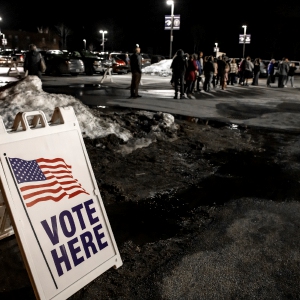Concord solidifies plan to respond to homelessness

A homeless encampment near the railroad tracks in back of the South Main Street Dunkin Donuts last month. GEOFF FORESTER/ Monitor staff
|
Published: 05-18-2024 12:00 PM
Modified: 05-20-2024 10:27 AM |
Twice a day the fire department can expect a call relating to homelessness in some way, whether it’s a fire at an encampment that needs to be extinguished; the river flooded with high rains and campers are stuck on the banks, or a medical emergency requires the departments' attention.
Since the new year, the Concord Fire Department has averaged 58 calls a month in response to homelessness, according to Fire Chief John Chisholm.
As the number of people experiencing homelessness in the area continues to grow – requiring the time and attention of city staff and departments – Concord’s committee to end homelessness is setting forth a concrete agenda.
On Thursday, city leaders and community members gathered with the committee for a meeting facilitated by New Hampshire Listens, a community engagement initiative from UNH’s Carsey School of Public Policy.
Across the state, communities are differing in their solutions. Now, five key “aims” – from community outreach to eliminating veterans' homelessness by the fall – are driving Concord’s approach.
“I am confident that this community can make meaningful progress on the issue and find a more efficient, prudent approach," said Rosanne Haggerty, the chair of the committee and the founder and president of Community Solutions, a national nonprofit that works to end homelessness.
When there’s an emergency in Concord, a management system plan coordinates responses across the city fire, police and state departments. Responding to homelessness within this framework could look no different with the right coordination.
With a common picture of homelessness – who is experiencing it, barriers to housing and concrete data on individuals – all agencies can better understand the challenges facing the city, and implement an all-hands-on-deck response. That’s the first aim of the steering committee’s priorities.
Article continues after...
Yesterday's Most Read Articles
 After four decades collecting carts, Ricky Tewksbury will retire when Shaw’s closes mid-April
After four decades collecting carts, Ricky Tewksbury will retire when Shaw’s closes mid-April
 Written shooting threat sends Concord High students home early
Written shooting threat sends Concord High students home early
 Amy Doyle returns to Hopkinton School District to become next superintendent
Amy Doyle returns to Hopkinton School District to become next superintendent
 Concord Coach to resume daily bus service to New York City
Concord Coach to resume daily bus service to New York City
 Loudon school board member resigns; Merrimack Valley board accepting applications to fill seat
Loudon school board member resigns; Merrimack Valley board accepting applications to fill seat
Increasing communication is another new focus of the group – better explaining to the community that people in the city are aware of the issue and working towards solutions.
Of the five targets, the last three have clear metrics: unsheltered homelessness will be reduced by 25% by July 2025; 100 units will be available to house people experiencing homelessness; veterans homelessness will reach a functional zero by the fall.
The Capital Area Street Outreach Team, who convenes weekly to collect data on the number of people experiencing homelessness, estimates that nearly 450 unhoused people are in Merrimack County. While the majority of these people are based in the city, this assessment still includes Franklin and other surrounding communities.
With a new proposed budget that will increase Concord’s taxes by just under 4%, Mayor Byron Champlin said it’s hard for him to justify the city’s time and resources being put toward a county-wide issue.
“The City of Concord is not responsible for a county-wide reduction in homelessness," he said. “We're happy to partner with it, but really, if it's a county problem, county government needs to be deeply involved in finding a solution."
But the reality is that people experiencing homelessness can often be transient across communities. Valerie Guy, the executive director of the Friendly Kitchen sees it often. One week she’ll see people come in for dinner who have set up a shelter in Concord. Next, they’ll be off to Laconia before circling back.
The Concord Coalition to End Homelessness has also been able to secure housing for people in the greater Concord area, said Karen Jantzen, the executive director.
The Railyards, which is set to open in coming weeks on Langdon Ave in the South End, has accepted 10 project-based vouchers to house people transitioning out of homelessness. If the tenant moves out, the rental subsidy remains with the apartment for its next occupant. These units will begin to make a dent in the committee’s 100-unit goal.
But with little to no affordable housing availability in Concord, the city needs buy-in from local landlords to help house people in the area. While incentives are offered to landlords, like security deposit coverage and signing bonuses from the Coalition, there has been little interest in the program. To Jim Schlosser, the Ward 7 Concord City Councilor, this is an area where the city's chamber of commerce can step in.
If the chamber helped connect the committee to landlords, they could start to build a portfolio of those willing to take vouchers or rent to people transitioning out of homelessness.
“I think this is where landlords can step up,” he said. “It's not just hearing their concerns, but also inviting them to say, ‘We need your partnership to help solve this’.”
By October, the city wants to achieve “functional zero” for veterans experiencing homelessness. That means that when veterans are unhoused, it’s brief and temporary. In Merrimack County, estimates on the number of unhoused veterans hover between seven to 14 people.
While Concord is now going to start the clock on its own initiative to house veterans, the state legislature set a similar metric last year. By 2026, the Department of Military Affairs and Veterans Services has been ordered to end veterans homelessness.
“It’s a good law because it makes us focus on it,” said Warren Perry, the Deputy Adjutant General for the department. “But at the end of the day it’s really hard.”
While New Hampshire was one of six states to see it’s veterans homelessness population decrease last year, the number still hovers around 130 individuals.
It’s a population size that is manageable if veterans are connected to the right resources. But making sure that’s the case is an inherent challenge.
If a veteran is eligible for benefits through Veterans Affairs, there are a whole subset of specific services, from vouchers to other supports, available that they might not be aware of.
“It’s really important for us to be able to find veterans and get them connected to the services that the general population is not necessarily available to,” he said.
Housing the veteran population in Concord could be the first benchmark for the city to hit – “a great first bite, big bite out of the apple,” said Judith Kurtz, an at-large city councilor. If this was successful, it could cultivate support from other residents and convey to the community that progress is being made.
“Realistically this is a space where we could leverage a sense of social responsibility to get them housed,” she said.
Earlier this year, when Haggerty took over as chair of the steering committee and Schlosser was appointed the council representative, the two took a drive to Laconia to get ideas for reframing the group’s work.
In Laconia, the mayor’s housing task force brings together city leaders, businesses, social service agencies and others to guide the community’s response to homelessness.
Beth Hayward, who works for the Community Action Program in Belknap and Merrimack Counties, sits on the Laconia committee and is also in conversation with Concord about their response.
“Laconia is working really well,” she said. “We have all the right people at the table.”
The committee has discussed building a pallet community in Laconia, a cluster of small shelters for people experiencing homelessness. Ideas like this – alternative forms of shelter – are what needs to be on the table in Concord, said Terry Gladstone, an advocate for the homeless.
Gladstone has talked to city leaders about building a similar tiny home village in Concord. Beyond that, other participants Thursday questioned whether or not the city should set up a designated camping area – with dumpsters and port-a-potties.
“Why can't we find a place where these people can camp without getting run off every few weeks,” said Gladstone.
Last fall, the city of Nashua did this, providing a sanctioned camping area on a city owned plot of land off of the old park and ride, after shelter beds hit capacity.
Meanwhile in Manchester, Mayor Jay Ruias has vowed to eliminate camping in the city. Instead he’s proposed a n ew zoning ordinance that relaxes requirements for planning board reviews to ease accessory dwelling unit construction.
To continue the conversation, Concord’s steering committee meets bi-monthly, with the next meeting scheduled for June. The group plans to reassess these goals every six months.







 Henniker ponders what is a ‘need’ and what is a ‘want’
Henniker ponders what is a ‘need’ and what is a ‘want’ Boscawen residents vote to fund major renovation of public works building
Boscawen residents vote to fund major renovation of public works building ‘Voting our wallets’: Loudon residents vote overwhelmingly against $1.7M bond for new fire truck
‘Voting our wallets’: Loudon residents vote overwhelmingly against $1.7M bond for new fire truck In Pembroke, Education Freedom Accounts draw debate, voters pass budget
In Pembroke, Education Freedom Accounts draw debate, voters pass budget
